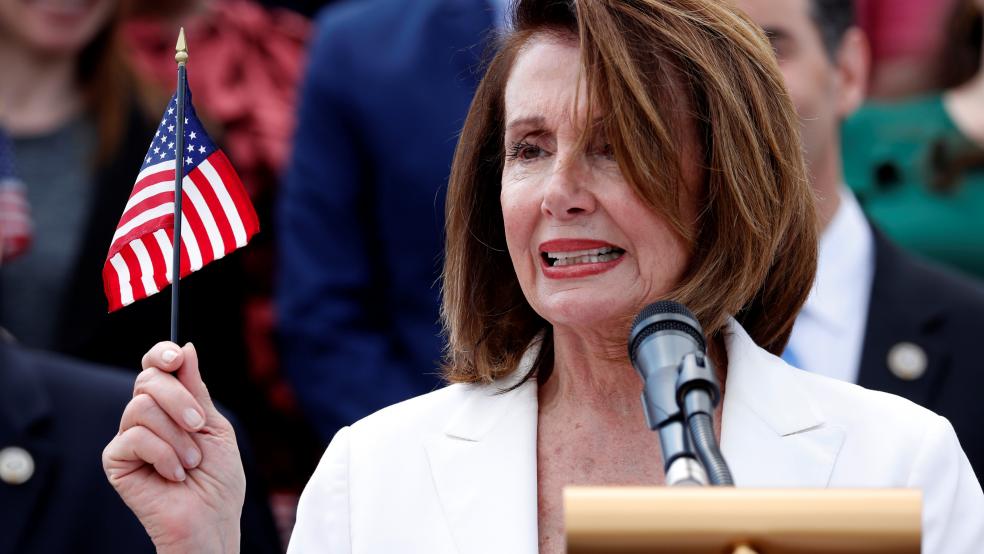With Democrats winning control of the House Tuesday, political experts are lining up to give advice on what they should do with their new powers. While there’s little chance of enacting significant legislation on their own given Republican control of the Senate and White House, Democrats could find issues in common to work on with the GOP – and if that fails, Democrats could at least try to convince voters that they are worthy of increased popular support in the 2020 elections. Here’s a roundup of ideas for specific policy areas that could get attention from Democrats in the 116th Congress, which gets started on January 3, 2019.
Infrastructure: "You know America is one big pothole,” former Transportation Secretary Ray LaHood said Thursday as he issued a plea to raise the federal fuel tax. Writing about a legislative agenda for the new Congress, Bloomberg’s Barry Ritholtz asked, “Is anything more of a legislative no-brainer than repairing and modernizing the nation’s decrepit roads, bridges, tunnels, airports and electrical grid?” Spending billions on infrastructure would be both popular and act as another economic stimulus, Ritholtz notes, President Trump has indicated that he is interested, although financing will no doubt remain a serious hurdle. If Democrats can’t make a deal on infrastructure, then it’s likely that little else will get done in the next two years, Ritholtz warns.
Health Care: Axios’ Drew Altman says that we can “expect a broad range of legislative proposals from House Democrats aimed at bringing the party together around a health care agenda,” although there’s little chance of any specific proposal becoming law in the next two years. In the meantime, Democrats can shore up Obamacare by expanding coverage and patching gaps, says The Washington Post’s Ronald Klain. Vox’s Dylan Scott advised Democrats to focus on high drug prices, too, although the current lack of clear policy proposals could be a problem.
Middle-Class Tax Cut: President Trump said Wednesday that he is open to the idea of raising taxes on corporations and/or the wealthy in order to pay for a tax cut for the middle class, although some conservatives are already pushing back on that idea. “Democrats are getting their hopes up, and I hate to hurt their feelings, but no,” anti-tax crusader Grover Norquist said, adding that the president wants to cut corporate tax rate even more – hardly an area of agreement with Democrats. Writing at Bloomberg, Karl W. Smith of the libertarian Niskanen Center said that extending the individual tax cuts could be a productive area for compromise.
Minimum wage: The Post’s Klain says that a bill that raises the federal minimum wage to $15 would bolster Democrats’ working-class appeal and provide a clear test for President Trump and the Republican Senate on where they stand on such a basic issue.
The deficit: One of the main fiscal challenges Democrats will have to address is the federal budget deficit, which is rising and could hit $1 trillion as soon as next year. Establishment Democrats have taken the deficit issue seriously in the past – some say they’re the only ones doing so – and Nancy Pelosi, the leading candidate for the next House speakership, said that she intends to follow the pay-as-you-go budgeting rules that require any increases in spending to be paid for with higher revenues or spending cuts elsewhere.
Michael R. Strain, a conservative economist at the American Enterprise Institute, summarized the establishment view that Pelosi could find persuasive: “With Democrats in control of the House and Republicans holding the Senate majority, the Congress as a whole is positioned to tackle the deficit in a manner that holds the most potential for real progress: through bipartisan compromise. Republicans will have to agree to increasing tax revenue’s share of national income, which should come from reducing loopholes and exemptions in the tax code. As for Democrats, they will have to agree to changes that reduce the future spending on middle-class entitlements like Medicare and Social Security.”
More progressive Democrats, however, have been pushing back against this compromise position.
Writing at Bloomberg alongside Strain Thursday, liberal economist Stephanie Kelton advised Democrats to take a very different path: “Advice to Democrats: Don’t repeat your biggest policy mistake. Don’t get trapped into thinking that your job is to restore ‘fiscal responsibility.’ Don’t reinstate PAYGO. Don’t worry about the deficit. Focus on how you would use deficits to build an economy that works for every American and not just those at the top. Be bold and fight for big things.”
Nick Hanauer, a venture capitalist who supports progressive causes, offered similar advice to Democrats dealing with the question of cost for a long list of policy ideas, from paid family leave to universal health care: “when you’re asked how you’re going to pay for all these things, grab a page from the Republican playbook: ‘They’ll pay for themselves.’ (Though in this case, by growing the middle class, they actually will).”




